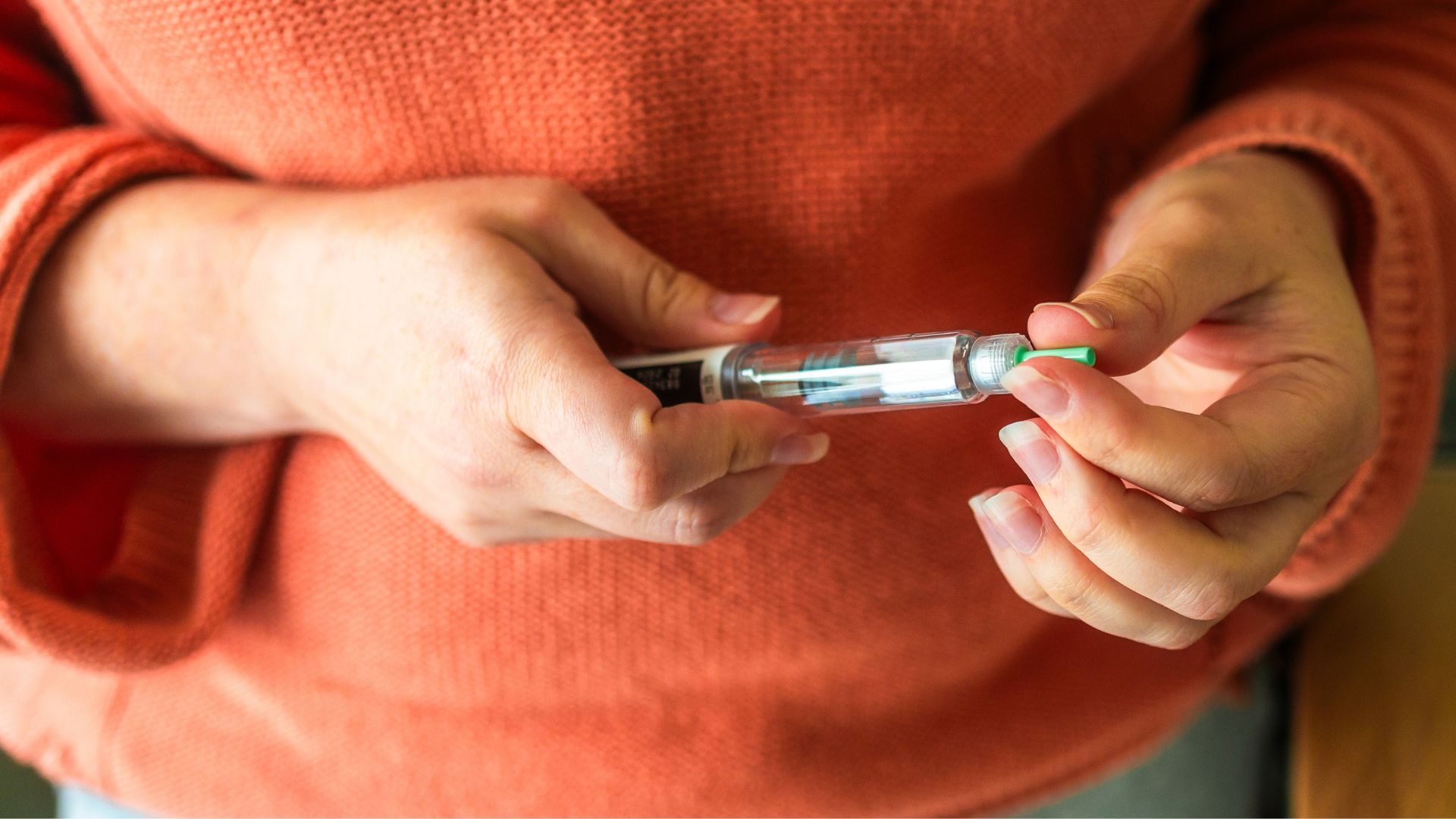
Sign up to our free daily email for the latest royal and entertainment news, interesting opinion, expert advice on styling and beauty trends, and no-nonsense guides to the health and wellness questions you want answered.
You are now subscribed
Your newsletter sign-up was successful
Want to add more newsletters?

Daily (Mon-Sun)
woman&home Daily
Get all the latest beauty, fashion, home, health and wellbeing advice and trends, plus all the latest celebrity news and more.

Monthly
woman&home Royal Report
Get all the latest news from the Palace, including in-depth analysis, the best in royal fashion, and upcoming events from our royal experts.

Monthly
woman&home Book Club
Foster your love of reading with our all-new online book club, filled with editor picks, author insights and much more.

Monthly
woman&home Cosmic Report
Astrologer Kirsty Gallagher explores key astrological transits and themes, meditations, practices and crystals to help navigate the weeks ahead.
While Ozempic landed in the United States a few years ago, Mounjaro became the first weight loss injectable to be approved in the UK only last year.
Since then, it's become the name on everyone's lips. Most of us have an opinion on it, and many will know someone on it, with almost half of the 1.5 million people in the UK on weight loss medication taking Mounjaro specifically.
But now, those who've taken up the weight loss medication have been met with a challenge. Eli Lilly, the manufacturer behind Mounjaro, recently announced a 170% price increase, taking the highest dose from £122 to £330, forcing thousands of people without an NHS prescription to pay a higher rate or stop taking the medication.
So what happens when you stop taking Mounjaro because you've reached your goal weight or don't want to (or can't) take it anymore? Here, woman&home speaks to two doctors and weight loss specialists to find out.
What happens when you stop taking Mounjaro?
1. You'll likely gain weight
Mounjaro, along with other GLP-1 treatments such as Ozempic and Wegovy, works by suppressing appetite and slowing down digestion, which leads to rapid weight loss. So, it shouldn't come as a surprise that weight gain is a very common problem among those who come off the drug.
The active ingredient in Mounjaro is tirzepatide, which works by mimicking the effects of glucagon-like peptide (GLP-1) and glucose-dependent insulinotropic polypeptide (GIP), two hormones that regulate appetite, food cravings, and blood sugar levels.
Once the drug is out of the body, it's natural for appetite to come back and daily food intake to increase. Dr Sindy Newman, a weight management expert, preventative medicine specialist, and founder of Diet UK, says weight gain is most common among those who buy the medication online and use it without expert supervision.
Sign up to our free daily email for the latest royal and entertainment news, interesting opinion, expert advice on styling and beauty trends, and no-nonsense guides to the health and wellness questions you want answered.
A doctor would be able to give "nutritional guidance, lifestyle coaching, and introduce exercise and movement" to those unfamiliar with them, says Dr Newman. "If you follow this advice, you'll be well prepared to come off weight loss medication."
She adds that those who use Mounjaro for a 'quick fix' are also more prone to weight gain. "It's important to understand that you're dealing with what's known as a chronic relapsing disease with obesity. And the only way you can control that, whether it's with medication or surgery, is to teach people the correct approach at the beginning of their weight loss journey,” she explains.
2. You'll feel hungrier
GLP-1 treatments can slow down digestion, but this will end when you stop taking them. Dr Donald Grant, GP and senior clinical advisor at The Independent Pharmacy, warns that most people feel hungrier more often during the day and tend to overeat, leading to bloating and other discomfort, and weight gain.
"As appetite differs dramatically once people come off the injections, it’s important to draw up a dietary plan, including structured meal times, to avoid overeating," he says. "I also recommend a well-balanced diet, including foods rich in protein, fibre, and healthy fats. Instead of opting for crash diets, people should establish a well-structured diet to get all the essential nutrients to support well-being.”
3. Blood sugar spikes
GLP-1 treatments were created to help people with or at risk of diabetes manage their blood sugar levels by “improving insulin resistance and slowing the digestive process”, explains Dr Grant.
When you stop taking them, you will see some changes, which he says cause “increased cravings leading to poor dietary habits, which can lead to blood sugar spikes".
Persistent high blood sugar levels can damage blood vessels, organs, and nerves in the body, leading to serious conditions like heart disease, kidney failure, stroke, vision impairment, and nerve damage.
A dietitian can help you choose low glycaemic index (GI) foods which will release energy slowly, keep your blood sugar levels stable and leave you fuller for longer.

Having a regular exercise routine can help manage some side effects of coming off Mounjaro, the experts say.
4. You might have loose skin
Excess skin is another common side effect of coming off Mounjaro. "If you've lost a lot of weight, then you might have loose skin, and people often report they feel ‘flabby’," says Dr Newman.
"Loose skin is most common around your abdomen, buttocks and sometimes in the face,” she says. This loose skin may leave you feeling self-conscious or even physically uncomfortable.
Weight training can build muscle, which may help improve the appearance of loose skin and provide a healthier outlook on weight management overall. To work out how much weight you should lift, speak to your GP or a specialist personal trainer.
This could happen whether you come off Mounjaro or not, however, as loose skin is caused by rapid weight loss.
In more extreme cases, people may need surgery to remove the excess skin.
5. You might not feel as motivated
The side effects of stopping Mounjaro are more than physical, Dr Grant warns. "Many people report a lack of motivation after stopping treatment, which is largely down to lost progress if increased hunger leads to weight re-gain."
Exercising regularly can help boost motivation to stay healthy and reduce weight gain. Asking for support from friends and family will also help with your motivation levels.
Can you just stop taking Mounjaro?
Ideally, no one will stop taking Mounjaro immediately. "You need to manage the reduction slowly," warns Dr Newman. "Don't just stop taking it altogether. You need to stop it gradually."
She says a doctor will want to monitor you, to see if you’re beginning to eat more or get hungrier. They will be able to help you maintain and stabilise your weight, alongside other important health checks.
“If a patient is effectively counselled and has implemented lifestyle changes, so they learn to eat and drink healthily, exercise effectively, and control the volume of food they consume before they come off of their medication, they should then be able to monitor their weight, and their weight should remain steady,” she explains.
What help is available to come off Mounjaro?
First things first, speak to your doctor. Even if you didn't obtain a Mounjaro prescription on the NHS, they will be able to provide an exit plan to come off the weight loss medication safely.
For those with an NHS prescription, NICE guidance says support should be offered for at least a year to help maintain weight loss after stopping the medication.

Kat Storr has been a digital journalist for over 15 years after starting her career at Sky News, where she covered everything from world events to royal babies and celebrity deaths. After going freelance eight years ago, she now focuses on women's health and fitness content, writing across a range of UK publications.
From perimenopause to the latest fitness trends, Kat loves researching and writing about it all. She's happy to give any fitness challenge a go and speaks to experts about wellbeing issues affecting people every day.
You must confirm your public display name before commenting
Please logout and then login again, you will then be prompted to enter your display name.
